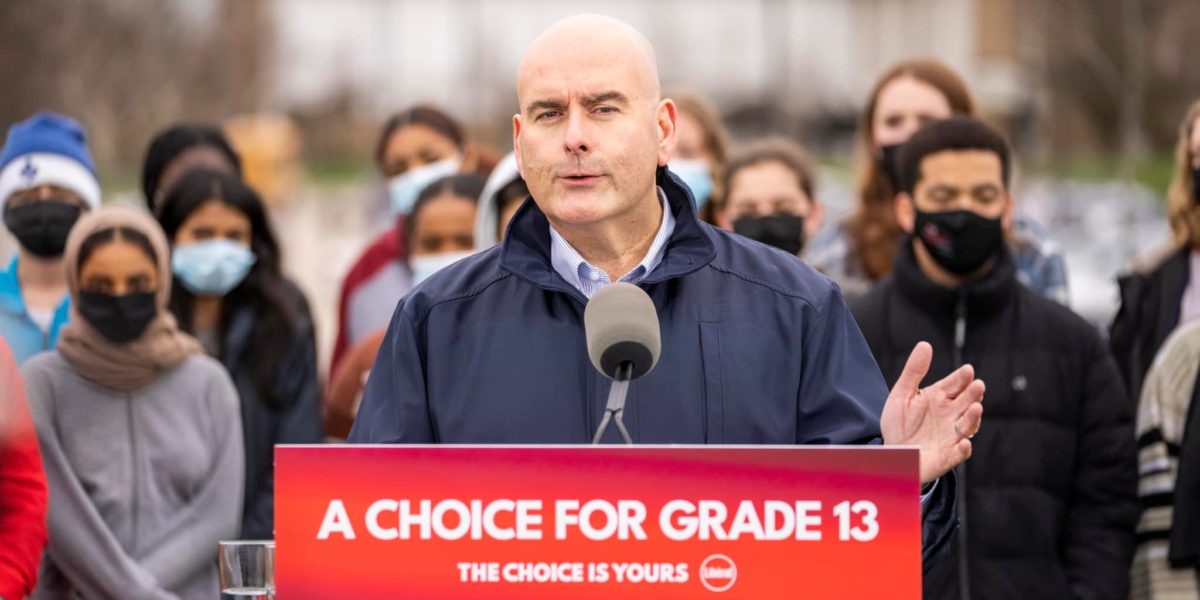- The battle before the battle. The first decision in Ontario’s election is who will be Conservative Leader Doug Ford’s main opponent: Liberals or NDP. If no one wins that, Ford wins, it’s already over. They’ll split the “left” vote, giving Ford an irrational majority per our stupid first-past-the-post system. It’s the Stephen Harper scenario for nine years in power without ever winning a majority of votes.
Others have noticed this. Justin Trudeau, exhausted by minority calculations, made a rickety pact with the NDP in Ottawa. In France, the two left parties have now done a deal. Labour in the U.K. is dickering with the Liberal Democrats.
It’s amazing there’s even a conflict to resolve. Andrea Horwath’s New Dems should’ve won the last election easily and should be the main alternative to Ford. Instead, the Liberals have pulled ahead of them in polls. How?
Blandness, perhaps. On day one, Horwath said, “There are people in this province who need homes and we’re here to say, You can have homes.” That’s really what you’re here to say? She addresses voters as “Friends,” clearly a strategic decision. It’s what Doug Ford also says (instead of “Folks”), doubtless after costly polling. It makes both sound like Quakers, or people who’ve been around each other too much. She says the main goal is to ditch Doug, a tricky point since he hasn’t been as bad as expected — though he could’ve been way better.
Liberal Leader Steven Del Duca has been surprising in his ability to sharply focus issues. Ban handguns. Period. Free public transit everywhere. Build or fix schools and pay for that by not funding dumb, counterproductive highways. Union legend Madeleine Parent used to say workers want to hear specifics, not slogans, but in clear language. The NDP platform on public transit, au contraire, sounds like a brief to the zoning committee (“Work with… Move forward on…”).
A peripheral but intriguing issue is, Who’s the real progressive? I think you could say that a smart, incremental approach to socialism — if anyone still cares about that — would mean making additional needed services free or nearly free, as we have with public education and health care. Why not public transit next? Why should we pay as riders when we’ve already paid as citizens?
Horwath would dole out funds to local bodies to help “bring down” fares. But that way we’ll never get there. If you start by being there (“Buck a ride, province-wide”) then it’s a given and you somehow, as with health care, find the money for it instead of expending huge volumes of verbiage on whether you can afford it.
- Farewell to Lafleur and his era. Guy Lafleur, the magnificent Montreal Canadiens forward of (at his height) the 1970s, played on the last Canadiens team equally split between anglophone and francophone players. They were the great example of how Canada could work as a binational reality.
That was the central issue of Canadian public life in those years. On the dour side, Quebec separatism scared the hell out of Anglos. Could we even exist on our own? On the bright side, Quebec was culturally and politically inspiring.
The team personified this nexus. Two games even embodied it: the Richard Riot of 1955, when fans stopped a game and spilled into the street to trash Anglo stores like Eatons. And 1976, when the separatist Parti Québécois won its first election, and players like Lafleur were shocked that more cheers went to the vote results flashed on the scoreboard than to the players and game itself.
That prominence in Canadian life lingered through two independence votes (1980, 1995) but has since faded. The PQ is now a husk. It’s been surpassed by Québec Solidaire, which is separatist but more centrally, socialist/feminist.
What has replaced Quebec’s grand dramas and inspires the young, here and there? That’s easy: Indigenous peoples and their causes, which were only occasionally mentioned during Guy Lafleur’s glory days. This column first appeared in the Toronto Star.



